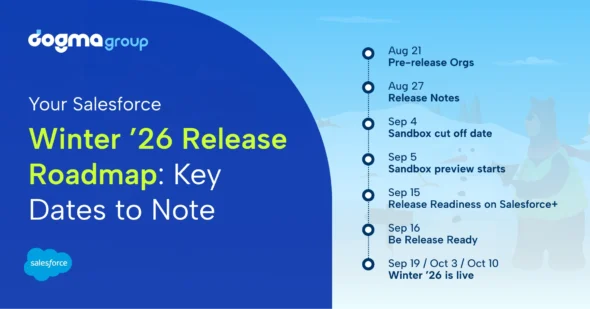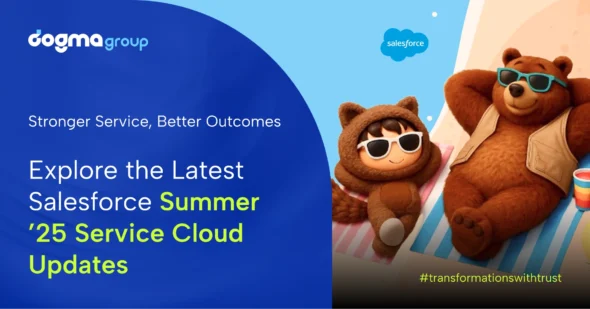The Salesforce Marketing Cloud Winter ’25 release brings many innovative features tailored to address the challenges faced by marketers and decision-makers. By focusing on automation, personalisation, engagement optimisation, and streamlined operations, these advancements aim to elevate your marketing strategies and enhance user capabilities. The Winter ’25 release introduces Marketing Cloud Advanced Edition, a significant upgrade for businesses seeking advanced marketing capabilities. This edition builds on the Growth Edition, adding features like conversational SMS messaging, A/B testing, and expanded AI tools. These enhancements streamline marketing operations and provide deeper audience engagement strategies, making it an essential choice for teams aiming for more impactful campaigns.
1. Optimise Engagement Timing with Einstein Predictive Tools
Engaging customers at the right time is no longer a guessing game with Salesforce’s powerful Einstein tools. With the new Einstein Send Time Optimisation feature, you can analyse customer behaviour to optimise engagement. Einstein Send Time Optimisation further integrates with Data Cloud reports, helping you identify optimal email-sending windows and build dashboards to analyse engagement trends. With features like Engagement Frequency, which tracks email saturation, and Engagement Scoring, which highlights the most engaged audience segments, you can better understand their customers’ behaviours. A weekly engagement chart provides insights into peak interaction times, allowing precise scheduling of campaigns. For Marketing Cloud Advanced Edition users, the introduction of global models for Einstein Send Time Optimisation improves predictive accuracy by analysing aggregated trends across Salesforce’s global customer base.
These predictive tools empower marketers to fine-tune their campaign timing for maximum impact.
2. Discover Optimal Engagement Paths with Advanced Flow Testing and Insights
Empower your marketing teams with enhanced tools for analysing and optimising campaign flows. The Flow Experiments feature in Flow Builder. allows you to split your audience into up to 10 groups and test different paths and strategies. By experimenting with different engagement strategies, your teams can identify the most effective approaches for engaging their audience. Alongside this, real-time insights are further supported by on-canvas analytics, which displays performance statistics directly within the Flow Builder interface, including the number of runs, successes, and errors for each element. These tools make it easier than ever to fine-tune your marketing strategies, using actionable, real-time analytics, for campaign success.
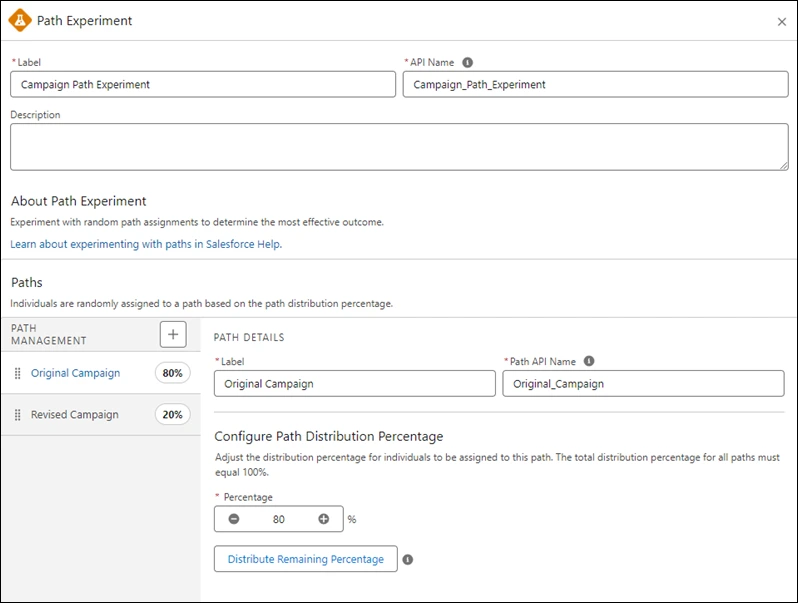
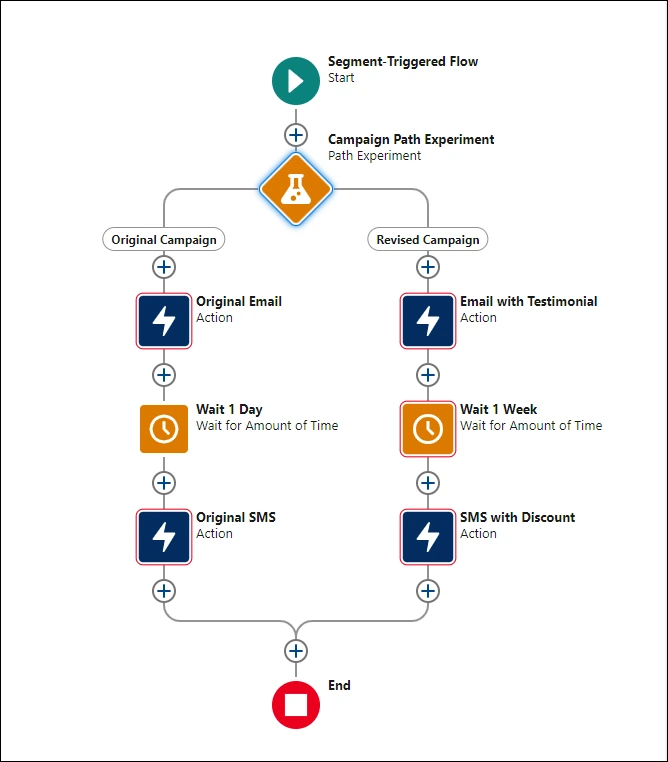
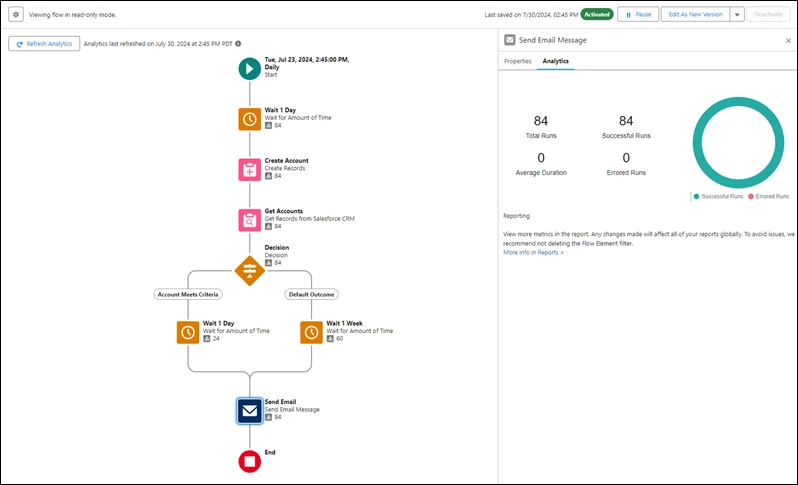
3. Grow Your Connections with Conversational SMS
Building meaningful customer relationships is easier with the addition of Conversational SMS, starting this release. The feature facilitates two-way messaging with prospects and customers, allowing prospects and customers to reply directly to marketing SMS messages. Integration with Service Cloud ensures that conversations can seamlessly transition to support teams when needed. By enabling real-time communication, this tool helps your business nurture leads effectively and improve customer satisfaction.
4. Automate Relevance with Event-Driven Campaigns
A key highlight of this release is the introduction of event-driven campaign automation, designed to streamline audience engagement by triggering email and SMS campaigns based on customer actions such as purchases or email subscriptions. These automated workflows reduce setup complexity through preconfigured flows, enabling users to create event-triggered campaigns effortlessly. By integrating merge fields with contextual event data, such as order amounts and shipping details, marketers can deliver highly personalised messages that strengthen customer connections.
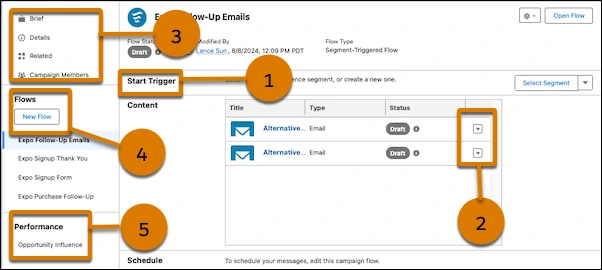
5. Scale Personalisation with Dynamic Content and AI
The ability to deliver tailored messages efficiently is crucial for marketing success, and Salesforce addresses this need with dynamic email content. This feature enables you to create a single email that adapts dynamically for different audience segments, including variations in subject lines, preheaders, and body content. Additionally, the integration of Einstein Copilot, a generative AI tool, further streamlines the personalisation process by drafting text variations for email components. These tools save time and ensure that every message resonates with its intended recipient.
6. Content Creation and Campaign Insights with Agentforce and Einstein
The Salesforce Winter ’25 release introduces powerful updates to generative AI tools, enhancing content creation and campaign management efficiency. With Agentforce and Einstein, marketers can quickly generate draft briefs, branded content, and messaging tailored to their company’s personality and tone. Additionally, the new Branding Fields feature allows for configuring default tones, enabling content adjustments from professional to casual styles effortlessly.
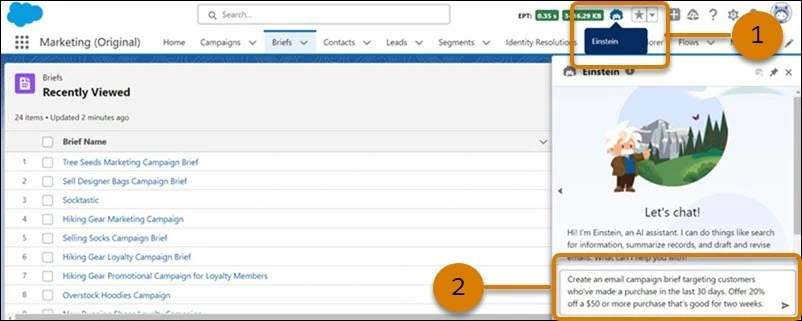
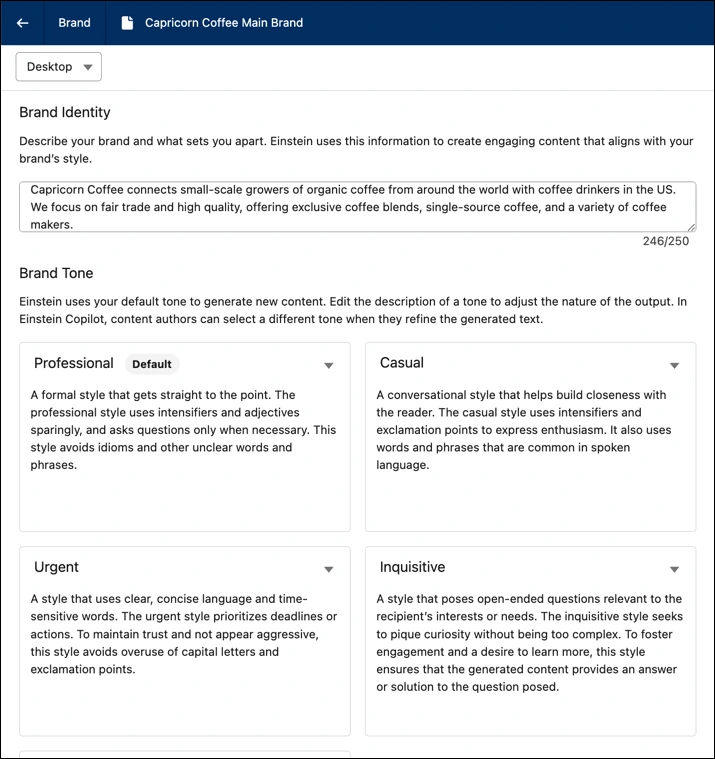
Furthermore, Einstein Data Prism now enriches segmentation by aligning natural language phrases with Data Cloud schemas, producing more accurate audience insights. The Campaign Summary tool provides AI-driven performance summaries, streamlining evaluations and making it easier to share actionable insights with stakeholders. These tools empower teams to deliver engaging, on-brand content while saving time.
7. Streamline Content Management and Accessibility
You can now share branded content across workspaces to improve content creation and accessibility. Workspace content sharing allows branded assets, such as logos, to be reused across different workspaces. This eliminates the need for duplication, enabling seamless collaboration across teams. Additionally, to enhance accessibility, images that are purely decorative can now be marked as such, allowing screen readers to skip unnecessary (alt text) descriptions. These updates simplify content management while ensuring a more inclusive experience for all users across campaigns.
8. Deliver Smarter Personalisation Across Channels with Einstein Personalisation
This winter release features Einstein Personalisation, a Customer 360 application integrated with Data Cloud to deliver AI-powered, real-time personalised experiences across Salesforce clouds. Using tools like real-time data ingestion, identity resolution, and calculated insights, this feature ensures customers receive relevant and individualised content. Its integration with Marketing Cloud enables enhanced targeting and path experimentation for email flows, while the Web Personalisation Manager simplifies creating AI-driven dynamic content for websites. Additionally, the Digital Wallet provides real-time tracking of Einstein Personalisation credit usage, offering detailed insights into consumption patterns for better resource management.
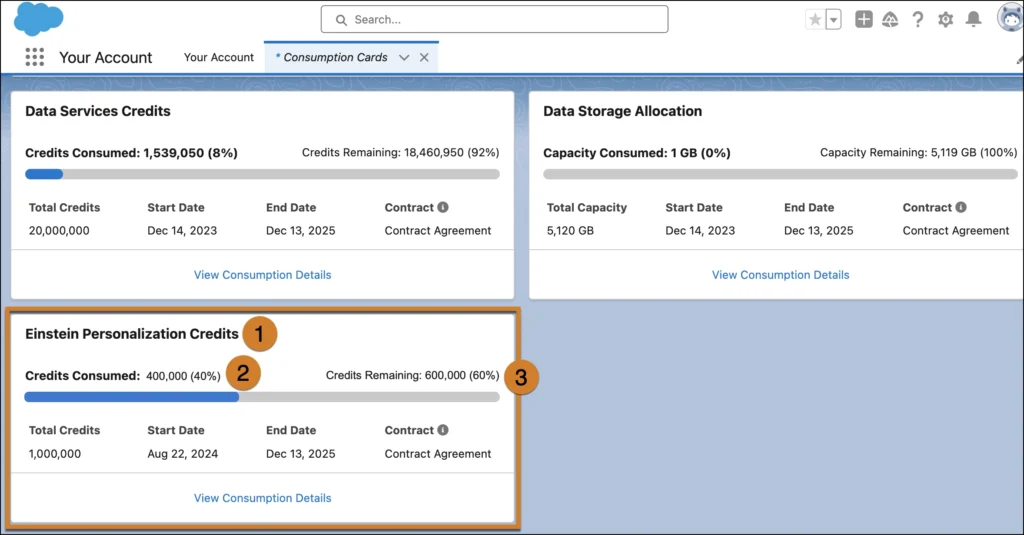
9. Streamline Operations with Enhanced Admin Tools
Managing complex setups is a challenge many teams face, but the updated Marketing Cloud Setup Assistant simplifies this process. The new assistant enables one-click installations or updates of required data kits, saving considerable time. Furthermore, the MCGSetupUserPerm permission has been introduced to ensure marketing admins have the access needed to complete configurations smoothly. These updates reduce administrative burdens and delays, improving overall efficiency and productivity.
10. Leverage Comprehensive Insights with Marketing Performance
Understanding campaign performance is critical for strategic decision-making. Tableau Einstein-powered Marketing Performance dashboards provide a detailed view of campaign performance metrics. These dashboards, embedded directly within campaign records and homepages, allow you to analyse top-performing content, monitor engagement trends across channels, and make strategic decisions. Your teams can now make informed adjustments in real time, aligning strategies with business objectives.
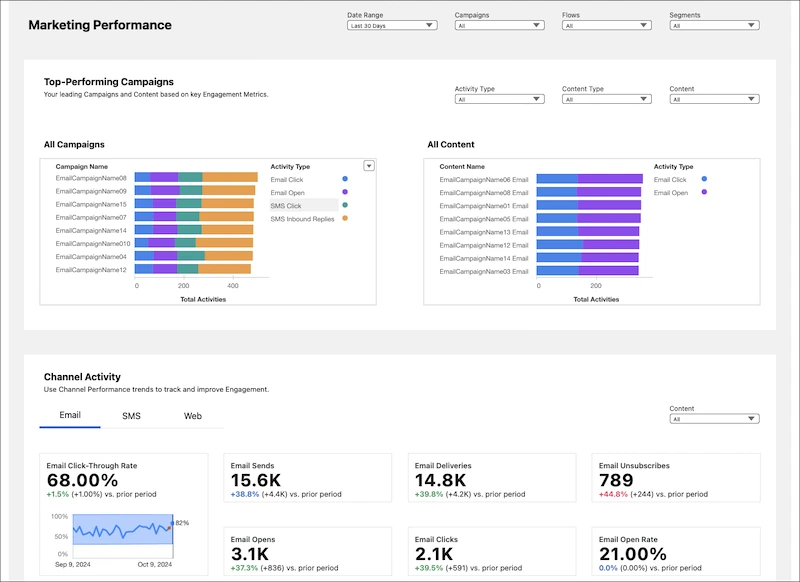
11. Enhanced Campaign Management and Insights for Account Engagement Users
The new release significantly enhances Marketing Cloud Account Engagement, offering a seamless transition to Salesforce Marketing Cloud’s advanced campaign creation process. You can leverage historical engagement activity, consent data, and existing assets for more effective campaigns. Email troubleshooting tools provide detailed issue reports for unsent emails, like invalid addresses. Moreover, duplicate prospect records can also be easily identified and merged to keep data clean, improving database accuracy.
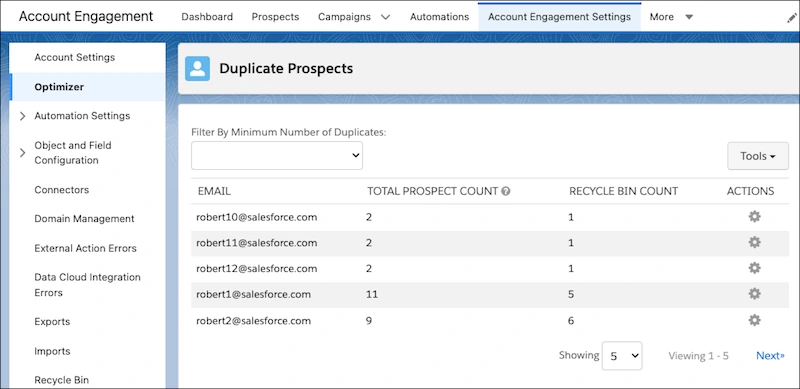
Additionally, integration with Data Cloud adds deeper insights from forms, landing page, and web engagement data. Businesses can now expand up to 25 segments per unit for more targeted marketing. Updates to the Account Engagement API now support advanced tag management, email sends, and enhanced data access for more simplified operations.
12. Boost Global Reach and Compliance with Einstein and Analytics
Consistency and localisation are pivotal in global marketing efforts. The Salesforce Winter ’25 release enhances Einstein generative AI to support content creation in six languages, including French, German, and Japanese, enabling users to localise messages for diverse audiences effortlessly. A new Audit Export Feature allows businesses to review and export the last 90 days of AI-generated content to ensure compliance with brand guidelines and refine their messaging.
Additionally, you can set up distinct brand identities for each business unit, ensuring personalised and consistent engagement tailored to their audience. These features streamline global marketing strategies, maintain brand alignment, and uphold safety compliance.
Additional Considerations: Key Updates in Salesforce Marketing Cloud
Opt-In Management for SMS:
- A default preference page for SMS subscriptions lets customers opt in or out of communications.
- Use the Preference Manager merge field to include the page link in messages.
Global SMS Support:
- Unified Messaging now supports sending SMS messages to Central America, South America, and Europe.
- SMS requirements vary by country, so configurations must meet local regulations.
Advanced Scoring Rules:
- Create or edit scoring rules with multiple conditions and group them for granular lead and contact scoring.
- Combine conditions to create complex rules tailored to business needs.
Enhanced Click Tracking:
- Web tracking tools now monitor link and button clicks on landing pages and external sites.
- Landing pages in Marketing Cloud enable click tracking by default, while external sites require updated External Tracking configurations.
Marketing Consent Component Retirement:
- The Marketing Consent Status component is being retired; switch to the Privacy Consent Status component to avoid disruptions.
Process Builder Retirement for Marketing Cloud Connect:
- Process Builder is being phased out in favour of record-triggered flows. Migration occurs automatically when journeys using Salesforce Data Events are stopped or published.


